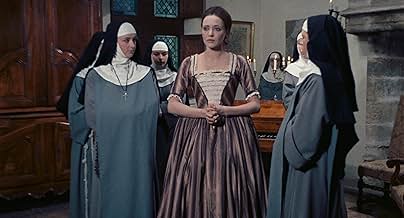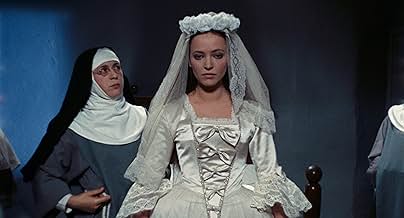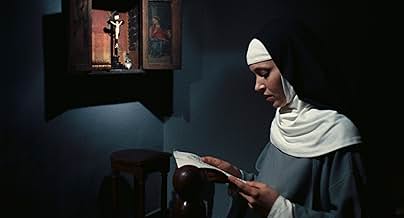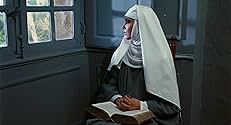Dans la France du XVIIIe siècle, une jeune fille est contrainte contre son gré de devenir nonne. Les trois mères supérieures qu'elle rencontre la traitent de manières radicalement différente... Tout lireDans la France du XVIIIe siècle, une jeune fille est contrainte contre son gré de devenir nonne. Les trois mères supérieures qu'elle rencontre la traitent de manières radicalement différentes.Dans la France du XVIIIe siècle, une jeune fille est contrainte contre son gré de devenir nonne. Les trois mères supérieures qu'elle rencontre la traitent de manières radicalement différentes.
- Réalisation
- Scénario
- Casting principal
- Récompenses
- 2 nominations au total
Avis à la une
The novel, supposedly inspired by the death of his sister in a convent, was unsurprisingly disdained by Catholics. When it was presented on the stage by Jean-Luc Godard with his then wife Anna Karina in the title role it caused not a ripple but when it came to the film version however, there were calls for it to be banned. There is no such thing of course as bad publicity and when it was released in 1967 the attendant controversy proved to be very good box office!
This is not an easy watch to put it mildly. Director Jacques Rivette makes no concessions to the viewer. There are few close ups, no score to speak of and the tempo is lento throughout its 135 minute length.
What it does have is four strong female roles played by four exceptional actresses. Anna Karina reprises her stage role of Suzanne and one can tell that she has lived with the part and made it her own. It is a stunning performance. Micheline Presle, in one of the best of her later roles, is the Mother Superior who takes Suzanne under her wing but whose death leaves her to the not so tender mercies of Sister Sainte-Christine whose excess of pious zeal is frightening. Francine Bergé's impersonation of a nun in 'Judex' might have caused a few tingles in the male of the species but her performance here gives one the shivers.
Once Suzanne has been moved to another 'maison' she then falls prey to the Sapphic advances of the Mother Superior played by Liselotte Pulver. This is another splendid performance by the luminous Liselotte and will come as quite a surprise to English speaking viewers who remember her dancing in a polka dot dress on a table top to the strains of the 'Sabre Dance' in Wilder's 'One, Two, Three'!
Of the male contingent, Jean Martin and Francisco Rabal both impress.
This is a tale of Repression and is shot in an austere, Bresson-esque style which suits the material very well. The trailer proclaimed it to be a 'Hymn to Freedom' which would have gladdened Diderot who famously wrote: "No man will be free until the last king is strangled with the entrails of the last priest."
The film follows the unhappy Suzanne's life as a nun. It falls into three sections, corresponding to the three Mothers Superior under whom she serves. The first, Madame de Moni, is a kindly woman who knows that Suzanne has only entered into the religious life with great reluctance and does her best to make the girl's life bearable. When de Moni dies, however, the new Mother Superior, the fanatical and puritanical Sister Sainte-Christine takes a dislike to Suzanne, whom she sees as rebellious, treating her harshly, whipping her, putting her on a diet of bread and water, and forbidding the other nuns to have anything to do with her. (Sainte-Christine is also referred to by her family name, Madame de Tourmont, a name probably chosen because of its similarity to "tourment", French for "torment").
With the assistance of a sympathetic lawyer, Suzanne asks to be released from her vows, on the grounds that she was forced to become a nun against her will. This application is unsuccessful, but at least she is transferred to another convent. Sainte-Christine is reprimanded by the Bishop for her treatment of Suzanne, but is not otherwise punished. This change in Suzanne's fortunes, however, is not necessarily for the better. Whereas Sainte-Christine's regime was characterised by an excess of religious zeal, life in the new convent is marked by an almost total lack of it. The nuns pay only the bare minimum of attention to their religious observances, spending most of their time in gossiping, eating and drinking and frivolous entertainments. Suzanne is befriended by the Mother Superior Madame de Chelles, who despite her elevated rank is a gay (in the original sense), light-hearted young woman, not much older than Suzanne herself. What the naive Suzanne fails to realise is that her new friend is also gay in the modern sense of the word and is offering her rather more than platonic friendship.
There are some excellent performances, from Anna Karina as the naïve but spirited Suzanne, Liselotte Pulver as the hypocritical de Chelles, Francine Bergé as Sainte-Christine and Francisco Rabal as Dom Morel, a priest who offers to help Suzanne but might also have self-serving motives. For a French movie this one is surprisingly international- Karina was Danish, Pulver Swiss and Rabal Spanish. Another important role is played by the German Wolfgang Reichmann.
When this film was made in 1966 it was promptly banned by the French authorities. It might have been the swinging sixties in the Anglo-Saxon world, but De Gaulle's France was a surprisingly conservative place. The authorities objected to what they saw as a disrespectful attitude to the Catholic Church, even though the action takes place 200 years in the past and the events depicted are fictitious ones. The film, however, is not particularly erotic; in Diderot's novel Suzanne and de Chelles actually end up in bed together- the younger girl is too innocent to realise what is happening to her- but this scene is omitted from the film.
The decision to omit this scene was, I think, the correct one, as "La Religieuse" was not made as a soft-porn fantasy but as a serious examination of three different types of religious hypocrisy, that of de Chelles, that of Suzanne's parents and that of Sainte-Christine, whose treatment of Suzanne owes more to an innate sadism than it does to genuine religious fervour. The serious nature of the film is emphasised by the austere look which director Jacques Rivette brings to it. Most of the action takes place in enclosed rooms, giving it a claustrophobic feel, and the predominant colour is the grey of the convent walls and of the nuns' habits. The moral climate in France gradually became more liberal, the ban was soon lifted and today "La Religieuse" can be seen as a major work of the French cinema. 8/10
In this first half or so the film is about as close as one can get outside of Carl Dreyer to it being about the pain inflicted upon an innocent in a world dominated by a) a natural prejudice towards women, in this case to go completely rigidly by the rules - or, b) for that matter, a hell placed upon those who *dont* want to be nuns and just want to experience something else in the world. We see Suzanne subjected to this convent at first run by a helpful and loving Mother Superior Mme de Moni only to die and her replacement be so hard-pressed as to eventually see Suzanne as being possessed by a devil, keeping her away from the other nuns, locked up without food or water, or any legal counsel.
This part seems straightforward as does the eventual Priests-find-out-Mme-is-unrelenting-and-transfer-her story progression... but something very fascinating happens, something that makes The Nun from what is already a heart-rending and tasteful story of repression and super 18th century Christian fervor into a great film. The second convent, on first appearance, is total bliss compared to the former one. Suzanne is treated to happy nuns, a happy Mother Superior Simonin, and even some lighthearted revelry like playing games outside, something that would have never happened at the previous convent. But there's also an underlying uneasiness that is confirmed by the Mother Superior being, how should I say, "clingy" to at first Suzanne's story and then Suzanne herself.
It's not just enough for Rivette, by way of the book, to show religion being domineering and cruel and at best complacent in the expected sense, but for another look at what should be religious organization run by caring and spiritual people to be also total kooks. It's like Rivette puts down this section of some fun like the slightest of reprieves and then to bring it back under the rug, and it's something really special to see. It's a bleak story not simply because a woman who has no rightful place in a convent of nuns is forced into it and made into another cog in the religious machine, but for the lack of hope conveyed in what good there is, the goodness of people devoted to a life of faith, that is revealed. It's an incredibly precise indictment on organized religion and society that allows how it runs as much as captivating morality drama.
The Nun can also be read as a searing feminist statement, but going into this part might make this too long a review. Suffice to say The Nun, a controversial film (at the time) made from a controversial book of its time, conveys what it wants to say in stark locations and even starker performances from the supporting cast. The two actresses playing the significant Mother Superiors in the story deserve credit, yet the main reason to see the picture is for Anna Karina. She makes a sense of purpose in every scene, a performance that is startling for it being so removed from ex-husband Godard's usual self-conscious comedy/dramas and into something that requires her to plunge the depths of whatever she can handle emotionally for the character. It turns out to be the best serious performance of her's I've seen to date outside of maybe Vivre sa vie. Suzanne, thanks to Karina, is so sad a character, so right in her common sense and driven almost mad by this rigid and monstrous Christian dogma that you cant take your eyes off her for a second. It's rare to see a performance this tender and selfless to the dark and light in human being. A+
Ms. Pulver, the beloved eternal comedienne of the German cinema, has taken on that most daunting role: the lesbian Mother Superior, the ultimate debauched nun in the ultimate 'Why was the Revolution necessary?' tale, Denis Diderot's grand tale 'La Religieuse'. Working against type and expectation under the direction of Jaques Rivette, Ms. Pulver has created the most complex and compelling portrait of her long career, and she has done this in ways that deviate radically from her former screen roles.
Ms. Pulver's Mother Superior, emerges in this adaptation with her monumental weakness intact. But something new and affecting is simmering within the character, a damning glimpse of self-awareness. You get the sense that if her frantic movement stops for a second, she'll deflate into a small and bitter creature.
In films like 'Die Züricher Verlobung' and 'Das Wirtshaus I'm Spessart' Ms. Pulver's persona has always been that of a delectable waif, a vulnerable creature with a heart of gold. Here she was cast against type and rumors went that she did not get along with Mr. Rivette. And then, halfway through the film, there she was, and for the first time in her long career she didn't look remotely like an ingénue.
Ms. Pulver's portrait is so intimate and persuasive that you aren't allowed to step back and think, 'What a monster she is.' That's because, thanks to this actress's willingness to turn herself and her character inside out, you've been inside her mind. What a sad and fascinating place it is.
Le saviez-vous
- AnecdotesDespite being approved by the Censorship Board the film's theatrical release was initial blocked by the Minister of Information.
- GaffesSuzanne plays and sings the song "Plaisir D'Amour". The final title card identifies the time and place as 'Paris, 1760', but the song was not composed until 1785.
- Citations
Monsieur Hébert: Your superior will shortly be told in the name of Sister Marie-Suzanne Simonin of a protest against her vows with a request to leave religious life and leave the cloister to live her life as she sees fit.
- ConnexionsFeatured in Deux de la Vague (2010)
Meilleurs choix
- How long is The Nun?Alimenté par Alexa
Détails
- Date de sortie
- Pays d’origine
- Sites officiels
- Langues
- Aussi connu sous le nom de
- Suzanne Simonin, La religieuse de Denis Diderot
- Lieux de tournage
- Sociétés de production
- Voir plus de crédits d'entreprise sur IMDbPro
Box-office
- Montant brut aux États-Unis et au Canada
- 30 245 $US
- Week-end de sortie aux États-Unis et au Canada
- 6 273 $US
- 6 janv. 2019
- Montant brut mondial
- 32 659 $US
- Durée
- 2h 14min(134 min)
- Mixage
- Rapport de forme
- 1.85 : 1

![Regarder Bande-annonce [OV]](https://m.media-amazon.com/images/M/MV5BZjIxOTRkY2ItNjJkOS00ZWMwLWFkM2UtY2FmYzU4NTIyNWQ2XkEyXkFqcGdeQXRodW1ibmFpbC1pbml0aWFsaXplcg@@._V1_QL75_UX500_CR0)

















